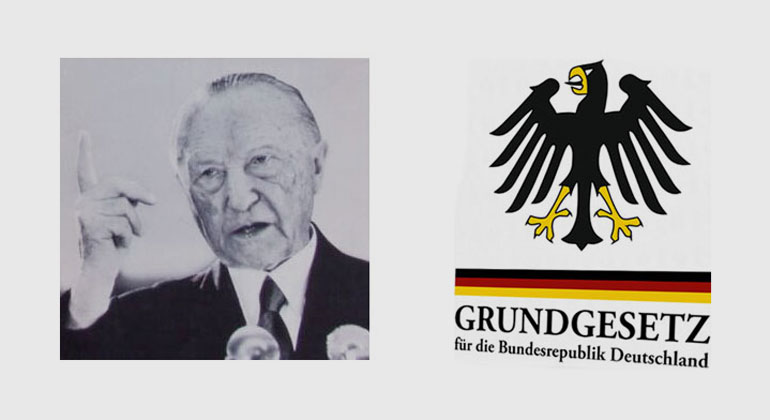Is Konrad Adenauer a role model for Friedrich Merz?
This has never happened before: the failure of a chancellor in the first round of voting is a historic first.
Since 1949, eight chancellors and one chancellor have all been elected in the first round of voting – albeit sometimes by an extremely narrow margin.
In 1949, Konrad Adenauer did not receive one more vote than was necessary, as is usually written, but exactly as many as were necessary for his election. Just one vote less and another ballot would have been necessary, as will be the case in 2025. On 15 September 1949, 202 of the 404 members of the Bundestag elected the first chancellor of the new Germany. Helmut Kohl also won by the narrowest of margins in 1994, with only one vote in the first ballot: he received 337 of 672 votes. In contrast, Angela Merkel received 146 more votes than necessary in her third election in 2013. But only once has a Federal Chancellor received more votes in his election than his coalition had members of parliament: in 1998, Gerhard Schröder received six more votes than his red-green coalition had.
The 1949 election results: CDU/CSU 31 per cent (139 seats), SPD 29.2 per cent (131 seats), FDP 11.9 per cent (52 seats), KPD 5.7 per cent (15 seats), Bayernpartei 4.2 per cent (17 seats), Deutsche Partei 4.0 per cent ( 17 seats), Economic Reconstruction Association 2.9 percent (12 seats), Centre Party 3.1 percent (10 seats), DKP German Right Party 1.8 percent (5 seats), Schleswig Voters’ Association 0.3 percent (1 seat). Under current electoral law, only the four parties that received more than five percent of the votes would have entered the Bundestag. But the five percent threshold did not exist in 1949.
Everything is different now, though: In the first round of voting, Friedrich Merz received only 310 of 328 votes from the CDU/CSU and SPD parliamentary groups. This means that at least 18 members of the two future coalition factions did not vote for him. To her own surprise, the President of the Bundestag had to bitterly conclude that Friedrich Merz had ‘not been elected Chancellor of the Federal Republic of Germany.’ Since the chancellor election is secret, the names of Friedrich Merz’s opponents or those disappointed in him will probably never be known.
However, the main reasons are likely to be that many SPD MPs had not forgotten that the chancellor candidate had recently broken his promise to form a firewall against the AfD and had described both the SPD and the Greens as ‘left-wing and green nutcases’. And some Union MPs were and remain bitterly disappointed that Merz, contrary to his election promises, will have to run up huge debts in order to be able to deliver on other election promises. Both fuel mistrust rather than trust.
That is why this election of the tenth German chancellor was closer than ever before. A second ballot was necessary to elect Friedrich Merz as chancellor with 325 votes. A second ballot, indeed!
One thing is certain: Konrad Adenauer knew who he was voting for in 1949: himself. After the extremely close election, he said to his neighbour in the Bundestag, in what has become a historic phrase: ‘Et hät noch immer jut jejangen’ – ‘It still went well.’ I wrote my dissertation about this historic first Bundestag election and Adenauer’s no less historic election. We know that Adenauer voted for himself. He confirmed this several times later, including to me. After his election, the Frankfurter Rundschau recalled the words of King Pyrrhus: ‘Another such victory and I am lost.’
The GDR press, the press of the former Soviet zone, had very precise ideas about the new government of the Federal Republic. On 21 December 1949, the East Berlin Berliner Zeitung wrote under the headline ‘Cabinet of traitors to the country’: ‘Big industrialists and puppets of the masters of the Rhine and Ruhr, separatists, collaborationists and traitors to the fatherland, notorious warmongers and anti-Soviet agitators, people who voted for the Enabling Act and whose activities during the Nazi era are mostly shrouded in secrecy – that is Adenauer’s collection of ministers.’
In the beginning was Adenauer
Nine factions in the first German Bundestag made forming a government complicated even back then. Without television, computers or opinion pollsters, but with the rules of the new constitution, the then 73-year-old Adenauer succeeded in laying the foundation for a solid and secure basis for his 14-year reign and his party’s 20-year reign.
In May 1949, the Basic Law came into force as the new West German constitution. It was brought to life by voters and elected representatives in the first Bundestag elections and the formation of the first government. The election campaign, the election results and the formation of the first government in 1949 were the first major political game played on the still bumpy turf of the new Federal Republic of Germany. At that time, 25 million voters took part in this game, a surprisingly high turnout of 78.5 per cent, even though millions of Germans had sworn after the Nazi catastrophe: ‘Never again politics.’ The Basic Law had come into force without consulting the voters. In the beginning was Adenauer.
Alongside Willy Brandt, Konrad Adenauer became the strongest political figure in post-war German history. What later became known as the ‘chancellor democracy’ had its roots in the 1949 union of Adenauer’s government and party functions. From the outset, the Federal Republic of Germany was relatively fortunate in its choice of top politicians, which was not the case for every country after 1945. It began with Adenauer.
Friedrich Merz sees Konrad Adenauer as his role model. With his policies, the first chancellor paved the way for German chancellor democracy. In doing so, he laid the foundation for that potestas, his power, without which his later autoritas, his authority, would not have been possible. This was and remains exemplary for the next chancellor.
- Franz Alt “It began with Adenauer” | It was the zero hour after 1945, when Nazi Germany was defeated. 75 years ago, on August 10, 1948, a great moment in the history of German democracy began at Chiemsee in Bavaria.
Source
Franz Alt 2025 | Translated with www.DeepL.com/Translator








